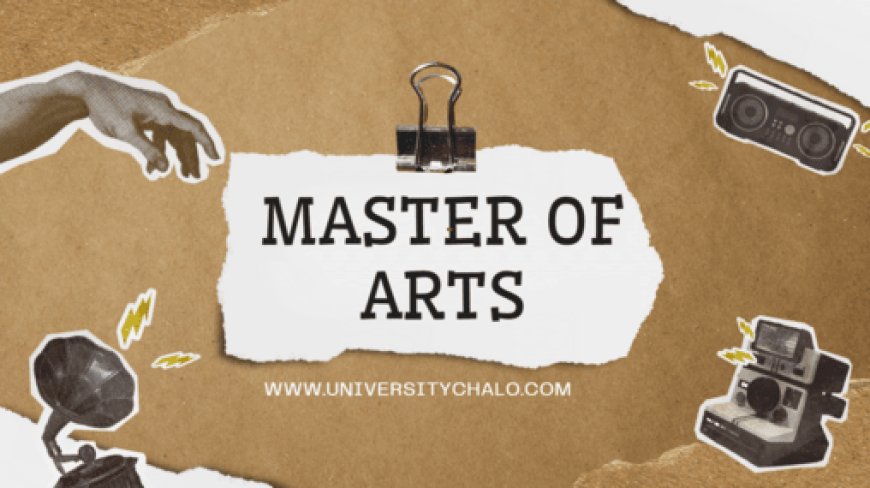Key Skills Gained from an MA Master of Arts Degree
Explore the key skills gained from an MA degree, including critical thinking, research, communication, and leadership, and how they benefit your career.

When you pursue higher education, one of the popular options is an MA (Master of Arts) degree. The MA full form refers to a postgraduate program that allows students to specialize in various subjects, including literature, history, psychology, sociology, and much more. This course offers a deep dive into specific fields of study, helping students develop essential skills for both professional and personal growth.
An MA degree not only enhances your knowledge but also equips you with numerous valuable skills. These skills can significantly improve your employability and open up a wide range of career opportunities. In this article, we will explore the key skills that an MA course can help you gain, and how these skills can benefit you in the future.
1. Critical Thinking
One of the most prominent skills gained through an MA program is critical thinking. In an MA course, students are often asked to analyze texts, theories, and ideas, which requires a high level of critical thinking. This involves not just understanding the material but also questioning assumptions, recognizing biases, and exploring alternative perspectives. Critical thinking is highly valued in many careers, as it helps in problem-solving, decision-making, and developing innovative solutions.
2. Research Skills
An MA program places a heavy emphasis on research, whether it’s for writing a thesis, conducting surveys, or reviewing existing literature. Research skills are one of the most practical tools that you will acquire. You'll learn how to gather data, evaluate sources, and present findings in a structured and compelling way. These skills are applicable in a variety of fields, from academia to business, and are essential for roles that require data-driven decision-making.
3. Writing Skills
Throughout an MA course, writing becomes an integral part of the learning process. Whether you’re writing essays, research papers, or a thesis, you’ll enhance your ability to articulate complex ideas clearly and coherently. You'll learn how to construct well-organized arguments, back them up with evidence, and present your thoughts in a logical, concise manner. Writing skills are crucial in many professions, particularly in roles that involve communication, such as content creation, journalism, public relations, and teaching.
4. Time Management
Completing an MA degree requires a considerable amount of independent work, including research, assignments, and exam preparation. This workload often requires excellent time management skills to stay on top of deadlines and balance multiple tasks. You’ll learn how to prioritize tasks, set achievable goals, and manage your time efficiently. Time management is a highly transferable skill that will benefit you in any professional environment, where meeting deadlines is a key part of success.
5. Communication Skills
An MA program often involves group discussions, seminars, and presentations, all of which improve your communication skills. Whether you are presenting your research findings to a class or engaging in intellectual debates, you'll develop the ability to express ideas clearly and persuasively. These communication skills are valuable in almost every career, especially in leadership and managerial roles, where effective communication is crucial for team collaboration and decision-making.
6. Analytical Skills
Another key skill gained from an MA degree is the ability to analyze complex information. You’ll be required to engage with dense theoretical material, dissect it, and draw meaningful conclusions. Analytical thinking helps you process information logically and assess situations from various angles. This skill is beneficial for positions that require high-level thinking, such as roles in finance, consulting, marketing, and research.
7. Cultural Awareness
Many MA programs include the study of diverse topics, cultures, and global perspectives. This exposure enhances your cultural awareness and understanding, which is increasingly important in today’s interconnected world. Whether you are learning about history, literature, or social issues, an MA program provides you with the tools to appreciate cultural differences and engage with people from various backgrounds in a more informed and empathetic way.
8. Problem-Solving Abilities
Throughout an MA course, you will be presented with complex problems that require innovative solutions. Whether it’s solving a theoretical problem in philosophy or finding a practical solution in business or social sciences, an MA program teaches you how to approach problems systematically and think outside the box. The problem-solving skills you develop can be applied in various industries, helping you tackle challenges effectively and creatively.
9. Leadership and Teamwork
While an MA course often requires independent study, it also encourages collaboration. Many programs involve group projects, seminars, or team-based discussions, where you’ll learn how to work effectively with others. These experiences help develop leadership skills as well as the ability to contribute to team efforts. Whether you take on a leadership role in a group project or simply collaborate with your peers, these experiences can help you develop both leadership and teamwork skills, which are highly valued in the professional world.
10. Adaptability and Flexibility
An MA degree often requires students to engage with new ideas and adapt to different teaching styles and expectations. You may find yourself working with different professors or tackling unfamiliar subjects, all of which will require flexibility and an open mind. The adaptability gained through this process is invaluable, as it prepares you for a fast-changing job market, where being able to adapt to new technologies, trends, and challenges is essential.
11. In-depth Subject Knowledge
Naturally, one of the most significant benefits of completing an MA course is the deep knowledge you acquire in your chosen field of study. Whether it’s English literature, psychology, or international relations, an MA program allows you to specialize in a subject and become an expert in it. This in-depth knowledge can open doors to career opportunities that require specialized skills and can set you apart from others with a more general education background.
Conclusion
In conclusion, pursuing an MA (Master of Arts) degree provides more than just academic qualifications. It equips students with a broad range of skills that are applicable across a variety of professional fields. Whether it’s critical thinking, research, writing, or communication, an MA program offers the tools needed to excel in the modern workforce. Furthermore, these skills are transferable to many different industries, making graduates versatile and adaptable professionals.
An MA degree not only enhances your expertise in a specific field but also prepares you for future leadership roles. With the skills you gain throughout the course, you’ll be better equipped to solve problems, manage your time efficiently, and communicate effectively in any professional setting.
FAQs:
-
What is the MA full form? The MA full form stands for Master of Arts, a postgraduate degree that allows specialization in various fields such as literature, history, and social sciences.
-
What skills do you gain from an MA degree? Key skills gained from an MA degree include critical thinking, research skills, writing skills, time management, communication, and leadership abilities.
-
Is an MA degree worth it? Yes, an MA degree is valuable for those seeking specialized knowledge and skills in a specific field. It enhances career prospects and offers opportunities for personal growth.
-
Can an MA degree help in career advancement? Absolutely! An MA degree provides in-depth subject knowledge and valuable transferable skills that can help you advance in your career, especially in leadership and research roles.
-
What are the different types of MA courses? MA courses are offered in various subjects, including English, Psychology, Sociology, History, Political Science, Economics, and many more. You can choose a course based on your interests and career goals.
What's Your Reaction?



















